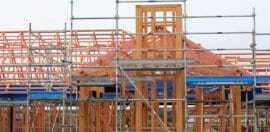Post-fire plan to house all Australians

3 February 2020 at 11:58 am
We must harness the collective goodwill that has been demonstrated after the bushfires as part of a longer-term and economically-based strategy to house all Australians, writes Robert Pradolin.
The impact the current bushfires are having on people cannot be understated. The scale of the devastation is unimaginable. Thousands of Australians have become homeless.
However, the numbers of Australians who were – and still are – experiencing homelessness before the fires, far exceed the number who will become homeless as a result of the fires. This is not to underplay the gravity of the current crisis, but we must harness the collective goodwill that has been demonstrated in recent days as part of a longer-term and economically-based strategy to house all vulnerable Australians.
Times of crisis bring out the best in people. While it will not bring back the homes or resurrect the agricultural businesses that have been in families for generations, an outpouring of community support does convey a strong message that we are all in this together.
The Business Council of Australia acted swiftly, decisively and purposefully. It is providing a conduit for businesses wanting to help. This includes addressing the critical issue of homelessness caused by the bushfires themselves, but it can also be part of the solution to the longer-term problem as well.
“What needs to be recognised is that before the bushfires struck, Australia was already suffering record levels of homelessness. The situation is now worse.”
The BCA has set up a Community Rebuilding Initiative chaired by Sir Peter Cosgrove. As the BCA states, “the initiative will focus on coordinating support from the business community”. This initiative has the ability to not only help the bushfire victims, but all Australians who find themselves homeless.
What needs to be recognised is that before the bushfires struck, Australia was already suffering record levels of homelessness. The situation is now worse. With that in mind let’s purposefully design and build temporary infrastructure to cope with immediate demands, but once this crisis is over, let’s focus on our existing homeless.
Left unaddressed, the increasing level of homelessness across our country will stand as an affront to our collective national conscience, just as the plight of those rendered homeless by bushfires has helped mobilise the nation.
Read more: What impact will the bushfire crisis have on homelessness?
Studies have shown that homelessness is the catalyst for a raft of issues including physical and mental health problems, interpersonal violence, increased policing and justice requirements and long-term welfare dependency. It will become prohibitively expensive for our society to continually fund the increase in services needed to help vulnerable Australians unless we address the homelessness crisis now. We can’t wait for these costs to multiply. We need to invest in fixing the problem and reduce our long-term liabilities.
The homeless crisis caused by the fires has highlighted the tragedy of Australians becoming homeless. We need to acknowledge that we have more people currently sleeping rough in Australia than we will have as a result of the fires. The reason why this homeless crisis has not generated the same level of community concern is that the increase in people sleeping rough has happened over decades. The plight of the homeless is invisible to the majority of Australians.
We have a national public housing shortage of over 200,000 homes. Something like 8,000 Australians sleep rough every night. On top of this there are tens of thousands with no stable home. They are couch surfing or sleeping in cars. As a society, we have become desensitised to homelessness. Consequently it does not draw the same public or media attention.
“If we do not put in place a national strategy to eradicate homelessness, we will be leaving an intergenerational timebomb for future generations to face.”
Whether as a result of bushfires or unfortunate life circumstances, shelter is a fundamental human need (not human right), and if it is not provided, the long-term unintended consequences have huge social and economic impacts.
Just to be clear, I have always been (and still am) a commercially-driven business person. In my previous life as an executive of Frasers Property Australia (formally Australand), I involved myself in issues around housing and housing affordability. So, it is with a level of experience that I say: If we do not put in place a national strategy to eradicate homelessness, we will be leaving an intergenerational time bomb for future generations to face, with significant financial, economic and social consequences.
Let’s use the unfortunate opportunity created by the bushfires and recognise the long-term economic importance of housing all Australians. Let’s intentionally select the type of temporary accommodation we are mobilising so that it may have a multi-use, beyond the fires.
I encourage the BCA to continue the Community Rebuilding Initiative to house all Australians, including those that are currently homeless and on low incomes. It is in our children’s and grandchildren’s long-term interest to do so.
The provision of housing for all Australians needs to be viewed as a fundamental economic infrastructure upon which we build the prosperity and future of our country.
About the author: Robert Pradolin is the former general manager of Frasers Property Australia and founder of the private sector NFP, Housing All Australians. He is also on Summer Housing and Salvation Army Housing boards.








Dear Robert,
Your article gives me hope that others see the magnitude of the problem we face. Unfortunately none of these are politicians.
Under the banner Accessible George Town (AGT) in Tasmania, my friend Tony and I have been developing projects aimed at vulnerable people over the past 4 years.
These include Disability equipment such as wheelchair covers and car racks, prosthetics, car controls and transportable housing based on a sea container footprint.
Initially we were focused on SDA housing but have broadened our aims as Social Workers point us at other vulnerable groups.
Both of us have a lifetime of experience in the building and construction industries and are Engineering Designers with hands on knowledge of many processes.
Ironically, Tony has an Acquired Brain Injury brought about by a brain aneurysm12 years ago and now needs a lung transplant to survive. I am a Bilateral below Knee Amputee of 5 years due to Erythromelalgia. I survive in a wheelchair due to government disinterest in new prostheses. We are both in our 60’s.
My role has been to engage with Politicians and Bureaucrats trying to get some traction and enthusiasm from them. This has been largely wasted effort and certainly impacts one’s mental health.
If our designs were considered unsatisfactory we could understand but when they have never even been assessed before rejection (or being ignored) it has become demeaning and insulting.
We now have an abundance of 3D CAD designs which would reduce significantly the current prices vulnerable people pay for life sustaining equipment and housing and a dwindling ability to continue.
At present Australia faces historic tragedy but no political will to create an environment where ideas can be properly assessed
Thank you for giving me space to vent.